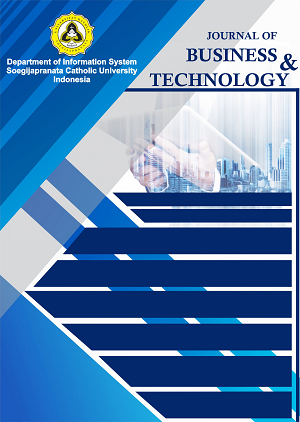Integration of Trivia Game Within the Metaverse Mall for Public Services in the City of Semarang
Abstract
The lack of education regarding the metaverse mall application for public services has left the public confused when engaging in public service activities within it. To address this issue, a trivia game titled "MPP Quiz" was created with the aim of understanding user responses to the implementation of an educational trivia game packaged with metaverse technology. The chosen research method is the waterfall model because its stages are well-suited for application in this study. The data collection method employed quantitative techniques by distributing questionnaires to respondents who had previously played the MPP Quiz game. After collecting the data, it was processed using the SPSS application to determine the level of validity, reliability, and correlation between the tested variables. Based on the conducted tests, it can be concluded that the MPP quiz game qualifies as an educational medium and introduction to the public service system in Semarang city, as the values of variables tested for validity, reliability, and correlation exceed the set standards.
Keywords
Full Text:
PDFReferences
B. Pamungkas and M. Yusuf, “Transformasi pelayanan publik kota di era Metaverse,” 2023. doi:
https://www.researchgate.net/publication/367089777.
Rita, “7. Pemanfaatan Metaverse Di Bidang Pendidikan 44-52”, doi: 10.38204/tematik.v9i1.945.
I. Akbar Endarto, “Analisis potensi implementasi Metaverse pada media edukasi interaktif,” Jurnal Barik, vol. 4, no. 1, pp.
–51, 2022, [Online]. Available: https://ejournal.unesa.ac.id/index.php/JDKV/
D. Rizkiani Oktavia et al., “Pemanfaatan Teknologi Metaverse dalam Komunikasi Layanan Publik,” 2023.
D. D. Harisdani and D. Lindarto, “Partisipasi Masyarakat Dalam Pengunaan Teknik Biopori Untuk Mengendalikan Banjir
Kota (Studi Kasus : Kelurahan Tanjung Rejo – Medan),” NALARs, vol. 17, no. 2, p. 97, Jun. 2018, doi: 10.24853/nalars.17.2.97-104.
C. Chinie, M. Oancea, and S. Todea, “The adoption of the metaverse concepts in Romania,” Management and Marketing,
vol. 17, no. 3, pp. 328–340, Sep. 2022, doi: 10.2478/mmcks-2022-0018.
Z. Abdurrohman and Y. Rosmansyah, “Rancang Bangun Sistem Visualisasi Masjid Salman Rasidi Menggunakan Virtual
Reality,” 2021.
R. Rinaldi Pradana, A. Surahman, and R. Rinaldi, “Perancangan Aplikasi Game Fighting 2 Dimensi Dengan Tema Karakter
Nusantara Berbasis Android Mengunakkan Construct 2,” Jurnal Informatika dan Rekayasa Perangkat Lunak, vol. 1, no. 2, pp.
–244, 2020, [Online]. Available: http://jim.teknokrat.ac.id/index.php/informatika
R. Azira, “Game edukasi pengenalan nama nama hewa melata pada anak usia dini menggunakan metode Multimedia
Develompment Life Cycle,” 2022, Accessed: Sep. 22, 2023. [Online]. Available:
http://repository.umuslim.ac.id/handle/123456789/204
P. Ilmiah, O. : Zog, B. Ridhoslaras, and P. Npm, “Analisis Cara Kerja Augmented Reality (AR) Sebagai Media Pembelajaran
Aksara Lampung.”
E. Dyah Kurnia and Y. Edy Nugroho, “Pelatihan Pembuatan Media Pembelajaran Aksara Jawa Bagi Guru Bahasa Jawa SMA
Di Kabupaten Rembang,” 2017. [Online]. Available: http://ppm.ejournal.id/index.php/pengabdian/article/view/22
A. D. Rachmanto and M. Sidiq Noval, “Implementasi Augmented Reality Sebagai Media Promosi Universitas Nurtanio
Bandung Menggunakan Unity 3D,” 2018. [Online]. Available: http://jurnal.unnur.ac.id/index.php/jurnalfiki
A. Nugroho and B. A. Pramono, “Aplikasi Mobile Augmented Reality Berbasis Vuforia dan Unity Pada Pengenalan Objek
D Dengan Studi Kasus Gedung M Universitas Semarang,” 2017. [Online]. Available: www.unity3d.com.
P. Studi, “Perubahan Sistem Informasi Uraian Jabatan Dari Bahasa PHP Ke C# Pada ASP .Net Di PT Pertamina ( Persero )
Marketing Operation Region V Surabaya Kerja Praktik,” 2018.
A. Rachmatullah, “Mempelajari C#: Bahasa Pemrograman Modern,” 2002.
DOI: https://doi.org/10.24167/jbt.v4i2.11533
Refbacks
- There are currently no refbacks.
e-ISSN: 2776-0332 | View My Stats



